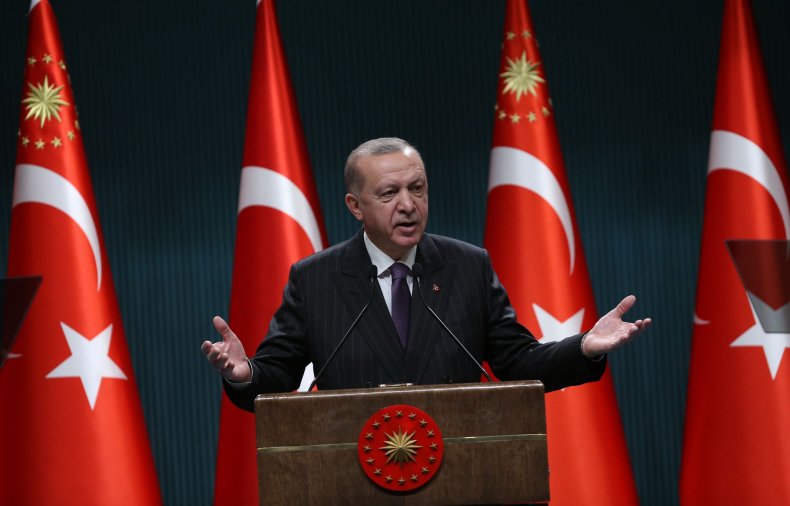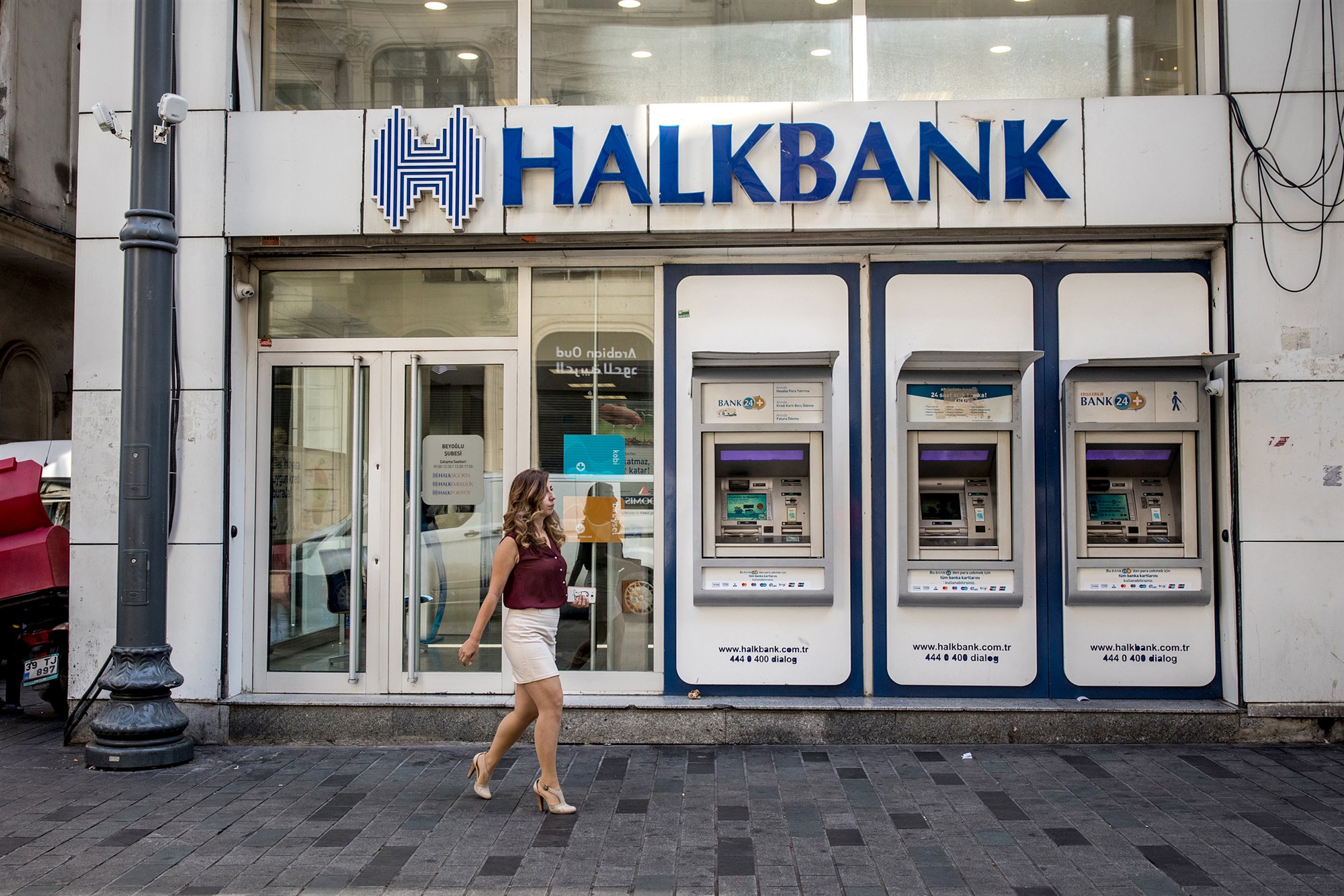Turkey’s currency is in free fall. International investors are fleeing the country. Accusations of bribery and support for terrorism abound. And something clearly is rotten at the heart of the Turkish banking system. Yet a Manhattan court still thinks Turkey is a functioning democracy with a fair and transparent legal system.
On March 17, 876 victims of Iran-sponsored terrorism appealed a Manhattan federal court’s dismissal of their case against the Turkish bank that they claim helped Tehran avoid the financial consequences of its support for these terrorist attacks. The court ruled in February that the plaintiffs, who are U.S. citizens or foreign employees of the U.S. government targeted during their service to the United States, should pursue their case before a Turkish court instead, ignoring substantial evidence that Ankara is covering up the bank’s complicity in Iranian sanctions-busting schemes.
Expecting American victims of the Tehran regime and their bereaved relatives to seek remedy through Turkey’s deeply politicized courts only ensures further injustice.
The plaintiffs are pursuing civil action against Halkbank, Turkey’s second largest public lender. The bank is also facing a federal indictment on charges of fraud, money laundering and offenses related to its participation in a multibillion-dollar scheme to evade U.S. sanctions on Iran. The extent of the bank’s complicity became clear as the result of an earlier trial. In May 2018, a federal court sentenced Mehmet Hakan Atilla, Halkbank’s deputy general manager, to 32 months in prison for “participation in a scheme to violate U.S. economic sanctions imposed on the Islamic Republic of Iran.” (One of us, Mark Dubowitz, testified as a government expert witness in the case.)
The Manhattan judge overseeing the recent civil action against Halkbank dismissed the case, ruling that a fair consideration and trial of the matter could be had in Turkey. She conditioned her dismissal on the bank’s agreement to “accept service in Turkey, submit to the jurisdiction of Turkish courts, and waive any statute of limitations defense that may have arisen since the filing of this action.”
Halkbank found those terms entirely acceptable because it knows Turkish president Recep Tayyip Erdogan will protect it at all costs. According to U.S. court records, senior Turkish officials received “millions of dollars in bribes” to facilitate the bank’s conspiracy. In fact, Erdogan has been manipulating Turkish courts since a 2013 graft probe first implicated him and his inner circle in Halkbank’s criminal activities.
Despite dismissing the civil action against Halkbank, the presiding judge acknowledged that the plaintiffs’ allegations about “efforts by Turkish officials to interfere with criminal investigations into Halkbank” are “serious and deserve attention.” But she ruled that these allegations are not sufficient to demonstrate that Turkey is an inadequate forum for the terror victims’ claims, since “the litigation would involve Turkey’s civil court system rather than its criminal law enforcement agencies.” That distinction is meaningless, however. No Turkish court can resist Erdogan’s pressure.
When details of Halkbank’s sanctions-busting scheme first became public in December 2013, the Erdogan government purged or imprisoned all police officers, prosecutors and judges involved in the investigation and muzzled the press and social media. Since then, the Turkish president has not only ensured impunity for all of Iran’s accomplices, but even rewarded them with cushy appointments.
These appointments, especially in Turkey’s financial sector, have only compounded the country’s economic problems. When Atilla returned to Turkey in July 2019 after serving his U.S. sentence, he became CEO of the Istanbul stock exchange. The finance and treasury minister who appointed him—Erdogan’s son-in-law Berat Albayrak—is also implicated in the Halkbank indictment.

Nine days after Atilla’s appointment as CEO, a disgruntled European Bank for Reconstruction and Development—Borsa Istanbul’s only major foreign shareholder—announced its intention to sell its 10 percent stake in protest, an exit it finalized within two months. Last weekend, Erdogan appointed Sahap Kavcioglu, who served as a deputy general manager at Halkbank alongside Atilla at the height of Iran’s sanctions evasion schemes, as the governor of Turkey’s central bank. On Monday, Turkey’s stock market and currency plunged, following the biggest single-day selloff in three years.
Erdogan is so determined to protect Halkbank that he sought to interfere with U.S. judicial proceedings and reportedly came very close to succeeding thanks to his close relationship with Donald Trump. The 2018 verdict against Atilla was the culmination of a two-year process that started with the March 2016 arrest of Reza Zarrab, the Iranian-Turkish ringleader of Tehran’s sanctions evasion network who since turned state’s witness. The Erdogan government used formal and informal channels to stall the U.S. prosecution of Zarrab, Atilla and Halkbank. This reportedly involved attempts to swap first Zarrab and then Atilla for North Carolina pastor Andrew Brunson, a hostage who spent two years in a Turkish prison on false charges. Ankara’s interference in the Halkbank prosecution is now part of a probe launched by Senator Ron Wyden (D-Ore.).
In an interview earlier this month, former national security advisor John Bolton stated that Erdogan was “completely focused on getting Halkbank out of the investigation and potential prosecution” and “raised the issue repeatedly with Trump.” The Turkish president went so far as to present President Trump with “a brief prepared by an American law firm working on behalf of Halkbank.” Trump unsuccessfully pressed then-secretary of state Rex Tillerson for help getting the case dropped in line with a prisoner swap deal put forward by Rudy Giuliani, who represented Zarrab before becoming Trump’s personal lawyer.
The Erdogan government also lobbied the Trump administration into pressuring Manhattan federal prosecutors to drop the Halkbank case. The indictment of Halkbank only went forward in October 2019, after Erdogan ordered his troops to assault America’s Syrian Kurdish partners against the Islamic State, provoking outrage in Washington.
With Trump’s departure from office, Erdogan has lost considerable leverage, but is not giving up. The U.S. Court of Appeals for the Second Circuit in New York is currently evaluating Halkbank’s request for dismissal in the run up to the jury trial set to begin in May.
The Turkish president has every reason to fear action against Halkbank in U.S. courts. In his November 2017 testimony, Zarrab implicated Erdogan personally by declaring that the Turkish leader approved the use of public lenders to bust U.S. sanctions. In a 2020 interview with the Organized Crime and Corruption Reporting Project, one of Zarrab’s bagmen recalls Zarrab telling him that they have “nothing to fear from Turkish authorities” since “the government is in on it.”
Erdogan will simply not allow a Turkish court to offer a remedy to victims of terror attacks orchestrated by Tehran by acknowledging Halkbank’s complicity in the Islamic Republic’s sanctions-evasion schemes. Expecting American victims of terrorism to fight Erdogan in Turkish courts is not only unrealistic; it is a miscarriage of justice to which no federal judge should want to be party.
By:
Mark Dubowitz is the chief executive officer of the Foundation for Defense of Democracies. He was sanctioned by the government of Iran in 2019 and testified as a government expert in the 2017 Atilla case. Follow him on Twitter @mdubowitz.
Aykan Erdemir is a former member of the Turkish parliament and senior director of the Turkey Program at the Foundation for Defense of Democracies. Follow him on Twitter @aykan_erdemir.
Source: Newsweek



